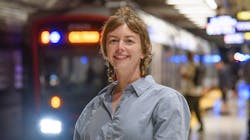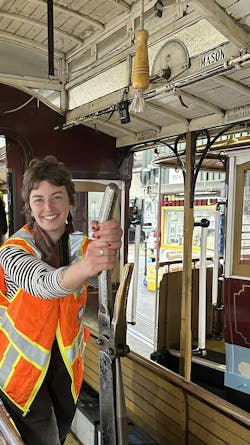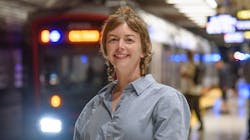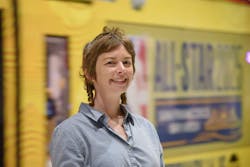One word to describe yourself: Collaborative
Alma Mater: Georgia State University; Claremont Graduate University
Fast fact about yourself: I lived in a small village in southern Iceland, where I witnessed the northern lights countless times.
What’s your best experience on transit and what made it memorable? I loved riding Via Rail from Jasper to Vancouver. The landscapes were incredible, and the dining car was top-notch.
Leslie Bienenfeld, manager of transit special operations for the San Francisco Municipal Transportation Agency (SFMTA), began her transit career in college, advocating for transit and environmental policy. Her first job was with a consulting firm in Atlanta, conducting transit surveys. After moving to San Francisco, she joined SFMTA as an intern with its SFpark program, a federally-funded project to pilot demand responsive parking prices. She would eventually join the team on a full-time basis.
During her 16 years at SFMTA, Bienenfeld advanced through roles in infrastructure asset management, rail scheduling and ITS engineering. She helped implement Muni’s upgraded CAD/AVL and real-time customer information systems. She led the industry by launching online bidding for signups at Muni’s nine operating divisions, eventually moving the agency to 100 percent online bidding during COVID-19.
Today, Bienenfeld manages SFMTA’s Transit Special Operations team, which focuses on temporary service changes to support special events, major capital and infrastructure maintenance projects and managing third-party construction in a city dense with transit service and infrastructure. She takes pride in work that supports everyone from the dispatcher to the customer at the bus stop.
Bienenfeld places high value on wayfinding and clear communication, helping customers adjust quickly and confidently. For her, getting major service changes out to the public for trip planning is essential to real-time travel decisions and a smooth customer experience. Her approach emphasizes seeing the big picture, listening to stakeholders, minimizing impacts to operators and riders, building stable disruption plans and communicating early and often. She has led planning for high-profile events, including two Super Bowls, NBA All-Star Games and the APEC Leaders Summit, and is currently preparing for the 2026 FIFA World Cup.
She has a Bachelor of Arts in Urban Geography from Georgia State University. After gaining confidence in her commitment to mass transit planning and operations, she went on to earn a certificate in transit and paratransit management from the University of the Pacific. After more than 10 years in the industry, she became more interested in culture change in large organizations, especially around evolving technology. She completed a Master of Science in Information Systems and Technology from Claremont Graduate University.
During the past 10 years, Bienenfeld has participated as an attendee, organizer and presenter for the American Public Transportation Association’s (APTA) Sustainability/Operations Planning and Scheduling Workshop, the Trapeze User Conference and the International Association of Public Transport’s Public Transit for Mega-Event series. She completed the WTS - Bay Area Chapter’s mid-career Women’s Leadership Program and early-career mentorship program.
Bienenfeld currently serves as chair of APTA’s Subcommittee for Transit Operations Planning and Scheduling and is in her sixth year on the Steering Committee. The subcommittee produces APTA’s annual Sustainability/Operations Planning and Scheduling Workshop.
Is there a specific experience that led you to where you are today?
My current job leverages skills from a lifetime of personal and professional experiences, but what really got me here was exploring my career path with a mentor. They asked me which job path sounded the most fun and what would happen if I took it. That conversation led me to where I am today, and I have no regrets.
What do you enjoy most about your job?
My favorite part of the job is working with outside groups to help make citywide celebrations and new infrastructure a reality. Achieving their visions in a transit-rich, dynamic city isn’t always easy, but we work together to make it happen with minimal impact on Muni’s customers and staff. It’s motivating to contribute to the vibrancy of San Francisco—a city I’m lucky to live and work in.
What’s the most challenging part of your job?
Getting enough rest! San Francisco is a bustling city, with Muni rail service serving two major stadiums year-round, several large-scale outdoor music festivals and multiple outdoor events along transit routes every week of the year. Meanwhile, Muni places a high priority on preventative maintenance and capital projects that increase the resiliency of the rail and trolley bus networks. This work requires multiple bus substitutions per year, including four weeks of early subway shutdowns for “Fix It Week,” which creates longer overnight work periods. Anywhere we can find a break in the event schedule, my team squeezes in a bus substitution. This means we have a very robust work plan and very little downtime.
What is the accomplishment you’re most proud of and why?
My colleague and I expanded the “Your Ticket is Your Fare” program for multiple events in San Francisco. This program packages a paid, all-day Muni pass with large-event ticket sales. It helps to increase transit mode share for large events, to clear neighborhoods of crowds and auto traffic quickly and to introduce new riders to using transit to travel into and around San Francisco.
What is your best advice/tip/best practice you can share from your area of expertise?
Listen to the people you’re working with and learn what matters most to them. When you account for your partners’ needs in your recommendations, you’ll often find the shortest and smoothest path to an agreeable solution.
About the Author
Brandon Lewis
Associate Editor
Brandon Lewis is a recent graduate of Kent State University with a bachelor’s degree in journalism. Lewis is a former freelance editorial assistant at Vehicle Service Pros in Endeavor Business Media’s Vehicle Repair Group. Lewis brings his knowledge of web managing, copyediting and SEO practices to Mass Transit magazine as an associate editor. He is also a co-host of the Infrastructure Technology Podcast.




